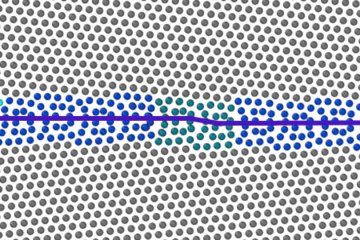All genres
1.
Journal Article
Nanocrystalline Ga–Zn-oxynitride materials: Minimized defect density for improved photocatalytic activity? Zeitschrift für Physikalische Chemie 234 (6), pp. 1133 - 1153 (2019)
2.
Journal Article
High-quality functionalized few-layer graphene: facile fabrication and doping with nitrogen as a metal-free catalyst for the oxygen reduction reaction. Journal of Materials Chemistry A 3 (30), pp. 15444 - 15450 (2015)
3.
Journal Article
A reevaluation of the correlation between the synthesis parameters and structure and properties of nitrogen-doped carbon nanotubes. Journal of Energy Chemistry 24 (4), pp. 407 - 415 (2015)
4.
Journal Article
CNT-TiO2-delta Composites for Improved Co-Catalyst Dispersion and Stabilized Photocatalytic Hydrogen Production. Catalysts 5 (1), pp. 270 - 285 (2015)
5.
Journal Article
High-concentration graphene dispersions with minimal stabilizer: A scaffold for enzyme immobilization for glucose oxidation. Chemistry - A European Journal 20 (1), pp. 5752 - 5761 (2014)
6.
Journal Article
High-Yield Exfoliation of Graphite in Acrylate Polymers: A Stable Few-Layer Graphene Nanofluid with Enhanced Thermal Conductivity. Carbon 64, pp. 288 - 294 (2013)
7.
Journal Article
The structural and electronic promoting effect of nitrogen-doped carbon nanotubes on supported Pd nanoparticles for selective olefin hydrogenation. Catalysis Science & Technology 3 (8), pp. 1964 - 1971 (2013)
8.
Teaching
Physical chemistry of surfaces and interfaces. Lecture: Course for PhD students of the IMPRS Surmat, Ruhr-Universität Bochum, Bochum, Germany, October 01, 2013 - October 31, 2013
9.
Thesis - PhD
Cyclodextrin for Zinc Corrosion Protection. Dissertation, Ruhr-Universität Bochum, Bochum, Germany (2017)
10.
Thesis - PhD
Investigation of Redox-Responsive Coatings for Zinc Corrosion Protection. Dissertation, Ruhr-Universität Bochum, Bochum, Germany (2015)
11.
Thesis - PhD
Ultrathin Chemisorbed Polymer Coatings: Corrosion Protection and Nanostructuring of ZnO. Dissertation, Faculty of Chemistry and Biochemistry, Ruhr University Bochum, Bochum, Germany (2014)
12.
Thesis - PhD
Degradation phenomena and design principles for stable and active Pt/C fuel cell catalysts. Dissertation, Fakultät für Chemie und Biochemie, Ruhr-Universität Bochum, Bochum, Germany (2013)











